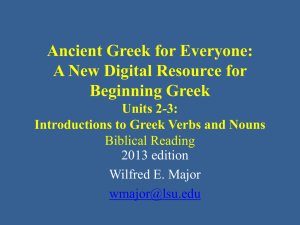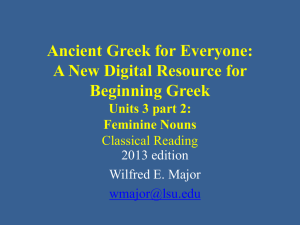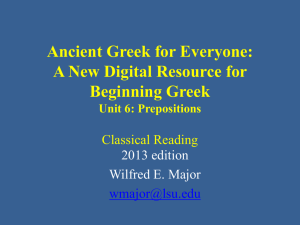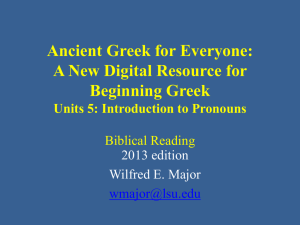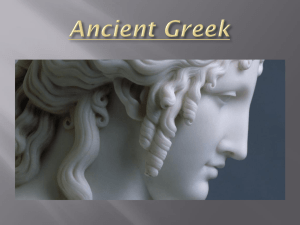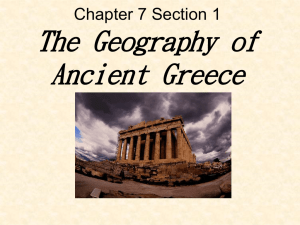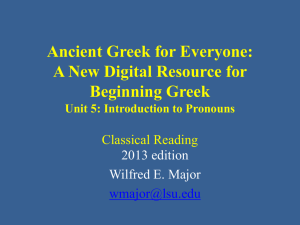Biblical reading - GREEK help at LSU
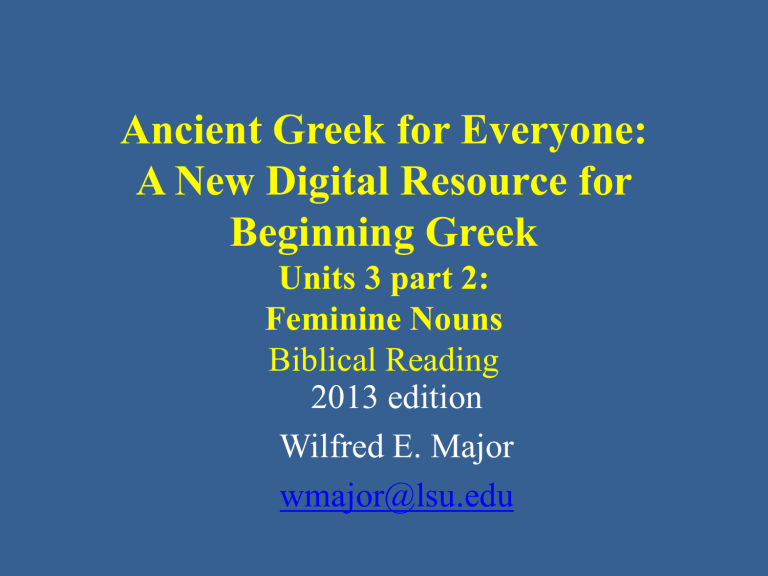
Ancient Greek for Everyone:
A New Digital Resource for
Beginning Greek
Units 3 part 2:
Feminine Nouns
Biblical Reading
2013 edition
Wilfred E. Major wmajor@lsu.edu
Ancient Greek for Everyone
•
This class
–
Unit 3 part 2 Biblical reading.
–
Be able to:
• read the sentences aloud
• parse each verb and noun (with article where it appears)
• translate the sentences into English.
Ancient Greek for Everyone
•
All the sentences here come from ancient Greek writings related to the Bible, Jewish history and early Christianity.
The passages are unchanged, except where … indicates a short omission.
•
To provide context for the quotation, there are brief introductions for the writings and stories.
•
At the bottom of each slide are vocabulary entries and notes.
These supply vocabulary and information for any words that have not yet appeared in the required vocabulary.
Ancient Greek for Everyone
•
Hebrew scripture was translated into koine Greek in the second century B.C., a collection called the Septuagint.
•
Early Christian writings cite scripture from the Septuagint and culled the Old Testament from it.
•
The Septuagint derives its name from the Latin versio septuaginta interpretum , "translation of the seventy interpreters," (Greek: ἡ μετάφρασις τῶν ἑβδομήκοντα ,
"translation of the seventy." The Roman numeral LXX
(seventy) is commonly used as an abbreviation.
•
The following readings are quoted from the Septuagint.
Ancient Greek for Everyone
• One of Job’s friends insists that Job can yet triumph: ἔστιν σοι ἐλπίς.
LXX Job 11:18
σύ (dat sg) you
Ancient Greek for Everyone
•
Job later replies to another of his friends:
ποῦ οὖν μου ἔτι ἐστὶν ἡ ἐλπίς;
LXX Job 17:15 ἔτι still, yet, now
μου my
οὖν therefore
ποῦ where?
Ancient Greek for Everyone
•
From a prayer for deliverance:
σή ἐστιν ἡ ἡμέρα, καὶ σή ἐστιν ἡ νύξ,
LXX Ps. 73:16 ἡμέρα (nom sg) ἡ day
καί and σή yours
Ancient Greek for Everyone
•
From a prayer by David when he was in a cave:
Σὺ εἶ ἡ ἐλπίς μου,
LXX Ps. 141:6
μου my σύ (nom sg) you
Ancient Greek for Everyone
•
From the prophecies of Ezra:
καὶ νῦν ἐστιν ἐλπὶς τῷ Ισραηλ.
LXX Ezra 1 8:89
καί and νῦν now
Ancient Greek for Everyone
•
The following reading is quoted from the New Testament.
Ancient Greek for Everyone
•
Paul is reassuring the congregation at Thessalonica. He famously describes the day of the Lord coming like a thief in the night. He then addresses the Thessalonians directly:
πάντες γὰρ ὑμεῖς υἱοὶ φωτός ἐστε
καὶ υἱοὶ ἡμέρας.
οὐκ ἐσμὲν νυκτὸς οὐδὲ σκότους
Πρὸς Θεσσαλονικεῖς α’ 5 :5
γάρ because, for ἡμέρας (gen sg) ἡ day
οὐδέ and not
πάντες (nom pl) all
σκότους (gen sg) dark
υἱοί (nom pl) ὁ sons ὑμεῖς (nom pl) y’all
φωτός (gen sg) light

